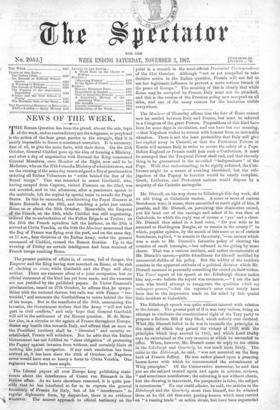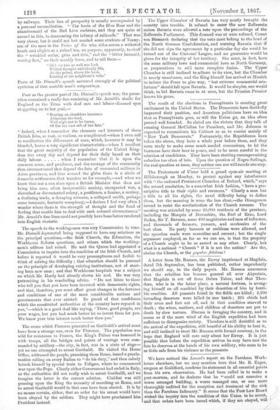The Edinburgh speech was quite without interest with relation to
the future. The greater part of if it was very tedious, being an attempt to vindicate the constitutional right of the Tory party to propose a Reform Bill if they liked, which nobody ever -doubted. What Mr. Disraeli failed to do was to reconcile the principles, in the name of which they gained the victory of 1866, with the principles which they avowed in 1867, and which Lord Derby says he entertained at the very moment at which he succeeded to office. When, however, Mr. Disraeli came to reply to his critics in the Edinburgh and Quarterly, he was much more lively. The critic in the Edinburgh, he said, "was not mounted on the fiery barb of Francis Jeffrey. He was rather placed upon a prancing hearse-horse with which he consummated the entombment of Whig principles." Of the Conservative surrender, he said that you see the subject treated again and again in articles, reviews, "and sometimes manifestoes; the colouring is not without charm, but the drawing is inaccurate, the perspective is false, the subject is monotonous." No one could admire, he said, the articles in the Edinburgh and the Quarterly more than himself, but he admired them as he did old first-rate posting-houses which once carried on "a roaring trade" as active rivals, but have been superseded by railways. Their loss of prosperity is usually accompanied by a personal reconciliation. 6' The boots of the Blue Boar and the chambermaid of the Red Lion embrace, and they are quite of
accord in this, in denouncing the infamy of railroads." That was
very clever, but it could not but remind some students of Tenny- son of the man in the Vision of Sin who rides across a withered
heath and alights at a ruined inn, on purpose, apparently, to chaff the " wrinkled ostler, grim and thin," and the "bitter barmaid, waning fast," on their mouldy loves, and to tell them-
" Oh! we two as well can look Whited thought and cleanly life, As the priest, above his book. Leering at his neighbour's wife."
Parts of Mr. Disraeli's speech savoured strongly of the political cynicism of that amiable man's outpourings.































